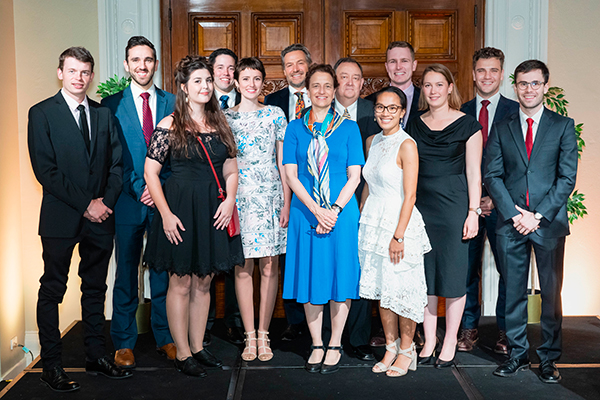Aiming to go truly international


In a bid to improve its diversity and world standing, Rhodes House is looking to increase its global intake of scholars, Alywin Chew reports in Shanghai.
It has only been four years since Chinese students became part of the Rhodes Scholarship community, but they have already impressed with their determination to become trailblazers and ambassadors for their nation, said Elizabeth Kiss, PhD, who became the first female warden of Rhodes House last year, during her recent visit to Shanghai.
"I think what sets Chinese Rhodes scholars apart is that they have a deep sense of being cultural ambassadors for China. Every year, they organize a trip to China for their fellow Rhodes scholars from nine countries. They do this on their own accord; the Rhodes House is not involved," says Kiss.
"They have this sense of wanting to educate fellow scholars about China and that's really special. They are also excited about forming an alumni (society) to create a really strong network in China. They have this desire to be trailblazers and want to do everything really well."
Kiss was in Shanghai during the second week of July to speak at a conference in Fudan University about residential education and service learning as well as attend fundraising events for the scholarship.
Established in 1902 by English financier John Rhodes, the Rhodes Scholarship, one of the most prestigious in the world, was first opened to Chinese students in 2015. Four outstanding students from China are awarded the scholarship every year, although Kiss is hoping to increase the intake to eight students in the coming years.
"The trustees were thinking about how they could make the scholarship as fresh and as relevant in the 21st century as it was in the 20th century. The original vision of the scholarship was limited to the English-speaking world, the former British empire plus the United States and Germany. But that's no longer the right vision for the 21st century," she explains.
"For it to remain as the preeminent scholarship in the world, the trustees realized that the scholarship has to become truly global, and China was the first, most important place to expand to."
Kiss says the scholarship numbers are set to rise from the current 100 to 125 per year. She points out that Asia, particularly China, commands the highest priority, but raising the current cap would depend on how quickly funds are raised to support the additional scholarships.
"We do a lot of work with scholars around questions of leadership, character and service, and those conversations will be enriched if we have scholars from many different backgrounds," she adds. "To be a leadership incubator for the 21st century, we have to have China and Asia well represented."
The warden says that she is honored and excited to be able to assume the role and that she has been heartened to see that more and more women are becoming Rhodes scholars. This year's scholarship cohort, she notes, marks the second time in its history that there are more female than male scholars.
Looking ahead, she is hoping to see greater gender diversity across the different fields of study, such as more female scholars becoming scientists and mathematicians, and more male scholars in the arts and humanities.
Besides gender representation, the scholarship also plays a role in improving international relations, says Kiss. She highlights how the annual trip to China that the Chinese scholars organize clearly exemplifies this.
"It was really inspiring to hear US scholars ask questions about China and the incredible development it has gone through in the last few decades. I think it's very important for American scholars to hear directly from the Chinese about this," she says. "There are a lot of stereotypes on both sides and the only way we can break down these stereotypes is to get to know each other."
Kiss also spoke to China Daily about global education, saying that there is room for institutions around the world to learn from one another and share best practices.
One example of a good practice, she says, would be how the Chinese education system goes about teaching languages.
"One of the things I'm so impressed by is how Chinese people speak English so well. I would love for Americans to learn from the ways in which the Chinese education system incorporates language instruction at early ages," she says.
"I think a wonderful global education standard would be to have students around the world learn languages at a younger age so that everyone can be multilingual."
Another practice that Kiss hopes to see become more prevalent around the world as the education sector evolves is service learning, which refers to education that incorporates experiences that can benefit the community. She notes that this form of learning is more holistic compared to traditional learning and can give students a more accurate view of the world.
The evolution of education will also have to take into account the new challenges that the digital age presents to the world, she adds, saying that schools will need to give students more opportunities to engage in teamwork and creative problem solving.
"Much of education today revolves around having a standard set of problems and a clear answer. This can be useful when students are developing knowledge and skills, but I think education needs to evolve to give students opportunities to work on unscripted problems," she says.
"In a world where we now have to navigate around artificial intelligence and figure out how we are going to use new technologies for good, we really need to have young people who are able to ask critical questions and work with others who bring different skills to the table."




































